Francis Davis Millet
Francis Davis Millet (November 3, 1848[1] – April 15, 1912) was an American academic classical painter, sculptor, and writer who died in the sinking of the RMS Titanic on April 15, 1912.
Francis Davis Millet | |
|---|---|
 Francis Millet, portrait by George Du Maurier, 1889. | |
| Born | November 3, 1848 |
| Died | April 15, 1912 (aged 63) RMS Titanic, Atlantic Ocean |
| Occupation | Painter, sculptor |

Early life
Francis Davis Millet was born in Mattapoisett, Massachusetts.[2] Most sources give his date of birth as November 3, 1846, but a diary which he kept during his military service stated that November 3, 1864 was his 16th birthday, indicating birth in 1848.[1] At age fifteen, Millet entered the Massachusetts regiment, first as a drummer boy and then a surgical assistant (helping his father, a surgeon) in the American Civil War.
He repeatedly pointed to his experience working for his father as giving him an appreciation for the vivid blood red that he frequently used in his early paintings. He graduated from Harvard with a Master of Arts degree. He worked as a reporter and editor for the Boston Courier and then as a correspondent for the Advertiser at the Philadelphia Centennial Exposition.
Career
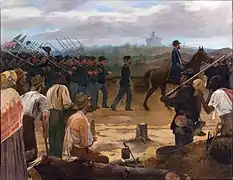
In 1876, Millet returned to Boston to paint murals at Trinity Church in Boston with John LaFarge. He entered the Royal Academy of Fine Arts at Antwerp, Belgium. He was the first student to win a silver medal in his first year; the following year he won a gold medal. In the Russo‐Turkish war of 1877–78, he was engaged as a war correspondent by the New York Herald, the London Daily News, and the London Graphic.[3][4] He was decorated by Russia and Romania for his bravery under fire and his services to the wounded.
Millet became a member of the Society of American Artists in 1880, and in 1885 was elected as a member of the National Academy of Design, New York and as Vice-Chairman of the Fine Arts Committee. He was made a trustee of the Metropolitan Museum of Art, and sat on the advisory committee of the National Gallery of Art. He was decorations director for the World's Columbian Exposition in Chicago in 1893, with claims he invented the first form of compressed air spraypainting to apply whitewash to the buildings, but the story may be apocryphal as contemporary journals note spraypainting had already been in use since the early 1880s.[5] His career included work on a number of worlds' fairs, including Vienna, Chicago, Paris, and Tokyo, where he made contributions as a juror, administrator, mural painter/decorator, and adviser.[6]
Millet was among the founders of the School of the Museum of Fine Arts, Boston, and was influential in the early days of the American Federation of Arts.[7] He was instrumental in obtaining the appointment of Emil Otto Grundmann, an old acquaintance from his Antwerp days, as first head of the school.[8] Millet was involved with the American Academy in Rome[9] from its inception and served as secretary from 1904 to 1911. He was a founding member and vice chairman of the U.S. Commission of Fine Arts, serving from 1910 until his death in 1912.[10] He died aboard the Titanic while traveling to New York City on Academy business.[6]
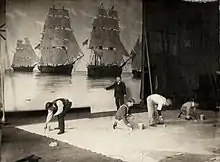
As well as an artist, Millet was a writer and journalist. He translated Tolstoy and also wrote essays and short stories. Among his publications are Capillary Crime and Other Stories (1892),[11] The Danube From the Black Forest to the Black Sea (1892)[12] and Expedition to the Philippines (1899).[13] He was elected a member of the American Academy of Arts and Letters and was an honorary member of the American Institute of Architects.
A noted sculptor and designer, Millet designed the 1907 Civil War Medal at the request of the U.S. Army and United States War Department and the 1908 Spanish Campaign Medal.[14] He executed the ceiling of the Call Room of the US Custom House at Baltimore, Maryland.[15]
Personal life
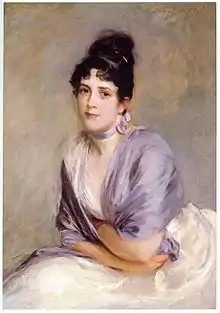
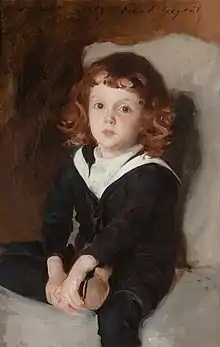
Millet was close friends with Augustus Saint-Gaudens and Mark Twain, both of whom attended his 1879 wedding to Elizabeth ("Lily") Greely Merrill in Paris, France; Twain was Millet's best man. The couple had four children: Kate, Edwin, Laurence, and John.[16]
Millet was acquainted with the famed American portraitist John Singer Sargent, who often used Millet's daughter Kate as a model. He was also close to the esteemed Huxley family.
Millet lived with Archibald Butt, who called him "my artist friend who lives with me", in a large mansion at 2000 G Street NW.[17] They were known for throwing spartan but large parties that were attended by members of Congress, justices of the Supreme Court, and President Taft himself.[18] There is some speculation that Butt and Millet were gay lovers. Historian Richard Davenport-Hines wrote in 2012:[19]
The enduring partnership of Butt and Millet was an early case of "Don't ask, don't tell." Washington insiders tried not to focus too closely on the men's relationship, but they recognized their mutual affection. And they were together in death as in life.
Death
On April 10, 1912, Millet boarded the RMS Titanic at Cherbourg, France, bound for New York City. He was last seen helping women and children into lifeboats. His body was recovered after the sinking by the cable boat Mackay-Bennett and returned to East Bridgewater, Massachusetts, where he was buried in Central Cemetery.[20]
Memorials
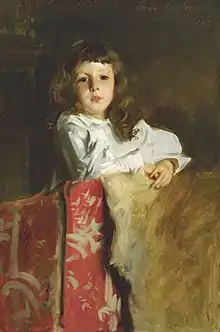
In 1913, the Butt-Millet Memorial Fountain was erected in Washington, D.C., in memory of Millet and his long-time friend Archibald W. Butt, with whom he shared a home.
A bronze bust in Harvard University's Widener Library also memorializes Millet.
In 2015, his murals were exhibited in Cleveland Ohio.[21]
Literature
- Beckwith; Baxter; Maynard; Blashfield, Edwin; Coffin (1912), Art and Progress, iii, Washington.
- Sharpey-Schafer, Joyce Anne, Soldier of Fortune: FD Millet, printed privately.
Gallery
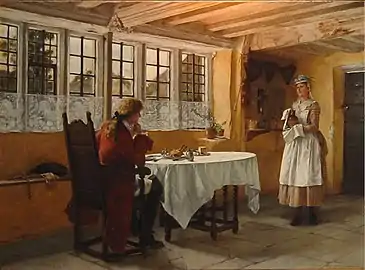 At the Inn, 1884
At the Inn, 1884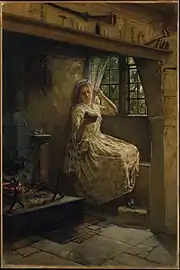 A Cosey Corner, 1884, Metropolitan Museum of Art
A Cosey Corner, 1884, Metropolitan Museum of Art An Autumn Idyll, 1892, The Brooklyn Museum
An Autumn Idyll, 1892, The Brooklyn Museum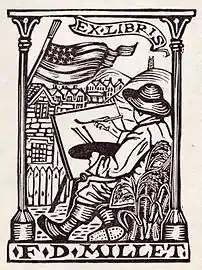 Bookplate of Francis Davis Millet
Bookplate of Francis Davis Millet%252C_by_Frank_Millet%252C_1877.jpg.webp) Portrait of Samuel L Clemens (Mark Twain), 1877
Portrait of Samuel L Clemens (Mark Twain), 1877
See also
References
- Millet, Francis Davis (November 3, 1864), Civil war diary, includes partial transcripts (diary entry), Smithsonian Institution, archived from the original on September 1, 2016, retrieved January 28, 2013.
- Moore, Charles (1933). "Millet, Francis Davis". In Malone, Dumas (ed.). Dictionary of American Biography. 12 (McCrady-Millington). New York: Charles Scribner's Sons. pp. 644–646. Retrieved July 21, 2018 – via Internet Archive.
- Forbes, Archibald (1895). Memories and Studies of War and Peace (2nd ed.). London, Paris & Melbourne: Cassell and Company Limited. pp. 17, 22, 234–235, 269. Retrieved July 27, 2018 – via Internet Archive.
- Thomas, Frederick Moy, ed. (1904). Fifty Years of Fleet Street being the Life and Letters of John Richard Robinson (1 ed.). London: Macmillan. p. 187. Retrieved August 16, 2018 – via Internet Archive.
- "Whet Moser, The Contentious Historical Origins of Spray Paint, chicagomag.com, Nov. 7, 2011". Archived from the original on July 19, 2018. Retrieved August 20, 2016.
- Gaines, Catherine S. A Finding Aid to the Francis Davis Millet and Millet Family Papers, 1858–1984 (bulk 1858–1955) in the Archives of American Art. The Francis Davis Millet And Millet Family Papers Online Archived December 6, 2010, at the Wayback Machine, Smithsonian Archives of American Art.
- American federation of arts, archived from the original on April 17, 2016, retrieved March 11, 2008.
- "Millet, Francis D", Other artists, John Singer Sargent Virtual Gallery, archived from the original on June 22, 2012, retrieved October 4, 2008.
- American academy in Rome, archived from the original on May 27, 2005, retrieved March 11, 2008.
- Thomas E. Luebke, ed., Civic Art: A Centennial History of the U.S. Commission of Fine Arts (Washington, D.C.: U.S. Commission of Fine Arts, 2013): Appendix B, p. 549.
- Millet, F. D. (1892). A Capillary Crime and Other Stories. New York: Harper & Brothers. Retrieved July 26, 2018 – via Internet Archive.
- Millet, F. D. (1892). The Danube: From the Black Forest to the Black Sea. New York: Harper & Brothers. Retrieved July 26, 2018 – via Internet Archive.
- Millet, F. D. (1899). Expedition to the Philippines. New York: Harper & Brothers. Retrieved July 26, 2018 – via Internet Archive.
- "SPANISH CAMPAIGN MEDAL (Army)". COMMEMORATIVE MEDALS FOR SALE. Foxfall Medals. Archived from the original on March 3, 2017. Retrieved October 9, 2018.
- "Maryland Historical Trust". US Custom House, Baltimore City. Maryland Historical Trust. November 21, 2008.
-
- D'Angelo, Gina M (2004). Francis Davis Millet: the early years of "A Cosmopolitan Yankee", 1846-1884 (Thesis). OCLC 84608598.
- Sharpey-Schafer, Joyce A. (1984). "6". Soldier of Fortune: F.D. Millet 1846-1912. Utica, New York: J.A. Sharpey-Schafer. p. 5 – via Gina M D'Angelo's thesis and Google Books.
Lily was soon pregnant again, and in July 1881 a son, Edwin Abbey Millet, was born and then tragedy struck this hap-[...]
- "Maj. Butt's Home Sold" Washington Post November 22, 1912.
- Davenport-Hines, Richard. "The History Page: Unsinkable Love." The Daily. March 20, 2012. Accessed 2012-05-18.
- Davenport-Hines, Richard. "The History Page: Unsinkable Love." The Daily. March 20, 2012. Accessed 2012-05-18.
- Wilson, Scott. Resting Places: The Burial Sites of More Than 14,000 Famous Persons, 3d ed.: 2 (Kindle Location 32543). McFarland & Company, Inc., Publishers. Kindle Edition.
- "The McKeesport Daily News 6-29-2015". Archived from the original on April 15, 2016. Retrieved June 30, 2015.
Further reading
- Brown, Glenn, ed. (1912). The American Federation of Arts: Francis Davis Millet Memorial Meeting. Washington: Gibson Bros. p. 62. Retrieved July 13, 2009.
- Mechlin, Leila (December 1909). "A Decorator of Public Buildings: The Work of Francis D. Millet". The World's Work: A History of Our Time. XIX: 12378–86. Retrieved July 10, 2009.
External links
| Wikimedia Commons has media related to Francis Davis Millet. |
| Wikisource has the text of a 1911 Encyclopædia Britannica article about Francis Davis Millet. |
- Engstrom, Peter A, Francis Davis Millet – A Titanic Life (biography), archived from the original on May 21, 2013.
- "Francis Davis Millet", Artcyclopedia.
- Works by Francis Davis Millet at Project Gutenberg
- Works by or about Francis Davis Millet at Internet Archive
- "Francis Davis Millet", Encyclopedia Titanica.
- "Francis Davis Millet and Millet Family Papers Online", Archives of American Art, Smithsonian.
- 1 painting by or after Francis Davis Millet at the Art UK site